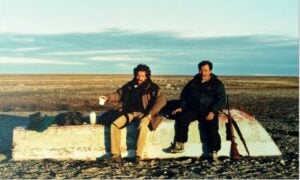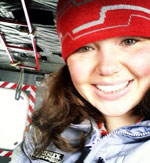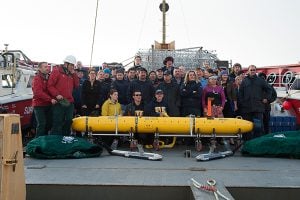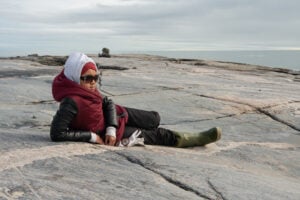Dave Woodman has participated in multiple expeditions to Canada’s Arctic in search of Sir John Franklin’s lost ships and written two books about the exploration disaster. He was the first scholar to explore the importance of Inuit oral tradition and testimony in determining Franklin’s fate – long before the 2014 discovery of HMS Erebus sparked new debate about the search.
Buy your tickets now!
At Can Geo Talks on April 12, Woodman and four other experts will speak about the use of Inuit traditional knowledge in locating Erebus and the ongoing search for HMS Terror.
Why is it important to discuss Inuit oral tradition?
When people talk about the role of Inuit oral history in the Franklin saga, it’s often misrepresented as ignored, which it wasn’t – it was just difficult to analyze – or irrelevant, which it wasn’t – it was absolutely essential to finding the ship.
Why are you passionate about this subject?
I wrote the book! In Unravelling the Franklin Mystery: Inuit Testimony, I examined Inuit testimony that had never before been published. I’ve also spent 40 years trying to enlist support to find the ship and was personally involved in nine expeditions to the area between 1992 and 2004.
What are some persistent myths about Inuit oral traditions
There’s this sense that it took too long to discover the ship, when in fact it was actually pretty easy to find. Also there’s the continued incorrect belief that other Inuit traditions related to the Franklin expedition remain untrustworthy.
Which as-yet-unsolved Franklin mysteries most interest you?
We actually have very little evidence about what happened to the expedition. Hopefully Erebus will provide many more clues, even documentation, to flesh this out. Also, there are other Inuit oral traditions about a major burial on King William Island, the location of Terror and what happened to the last few survivors, all of which could be followed up on now that the discovery of Erebus has shown the reliability of Inuit traditional knowledge.
Where do we go from here? It will take years of effort to properly investigate Erebus and find its sister ship, Terror. The search for Franklin’s grave is ongoing.
Don’t miss Can Geo Talks 2016: Inuit Oral Tradition and Franklin in Ottawa on April 12.







